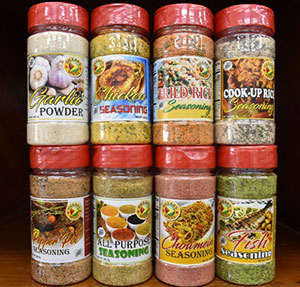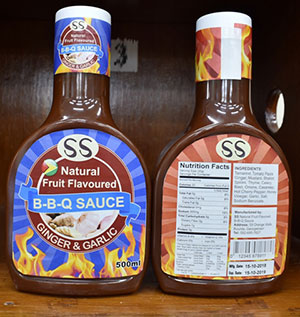– in an enabling environment supported by the GMC
THE Guyana Marketing Corporation (GMC) has heeded the task of driving the development of the non-traditional agricultural products industry here in Guyana. This is being done through the Agri-Business Development Unit (ABDU). The GMC has reported that the corporation has, over the years, been seeing a continued increase in the number of persons seeking assistance in the conceptualisation and development of new products and the further development of existing ones.

“It is not only about assisting agro-processors, but it is also about developing the value-chain to ensure sustainability of both the agro-processors’ investment and the farm investment,” said Ms Johan David, Agri-business Development Officer at the Guyana Marketing Corporation. She added that for the year 2018, the corporation assisted over 27 agro-processors.
According to the GMC, in 2018, support was provided for the product development of over 60 products. These included areas such as packaging, raw materials sourcing, and labelling, as well as scientific assessments, with the aim of improving the shelf life, taste and quality of products. The ABDU also offered assistance in the process of business registration, as well as assisting with the process of acquiring food manufacturers’ license.
COLLABORATIVE EFFORTS
The GMC stated that, for some agro-processors, the process of acquiring business registration and obtaining their food manufacturers’ licenses are sometimes confusing and frustrating. As such, the ABDU works hand-in-hand with the Deed’s Registry and the Government Analyst Food and Drug Department (GA-FDD) to ensure that the entire process is executed within a reasonable time frame.

“We believe that both fledgling and large companies require guidance and assistance, and product development is a small part of the work we do,” Ms David explained. “For the purpose of legality and formality, we are aware that all businesses must have a business registration facilitated through the Commercial Registry,” she further stated.
The office of the Agri-business Development Officer has seen a plethora of products over the years, but the most consistent products have been seasonings and pepper sauce. The reason for this, Ms David explained is: “Guyana, like many other Caribbean countries, continues to favour well-seasoned and spicy food; to this end, many new and current agro-processors have been battling to create the perfect seasoning and the perfect pepper sauce. It is for this reason the products that emanate from agro-processors, like UMAMI, continue to make waves on the local and regional market.
NEW BRANDS
Ms David stated that most of the new brands that emerged in 2018, have been as a result of the tutelage of the GMC, through the ABDU. Some of these brands are Sun Crest Rainforest Honey, Indigenous Coconut Oil and Diekah’s Spices.

“We are currently working with a number of agro-processors who will be launching great products in 2019,” Ms David revealed.
Another important element is financial guidance for agro-processors. One of the first training sessions conducted by the ABDU, in collaboration with the Market Extension Department, in 2018, was Cost of Production (COP). The COP training was conducted in six of the 10 Administrative Regions, namely:- Two, Three, Four, Five, Six and ten.
Limitations
Ms David noted, “Like any other sector, the agro-processing sector is not without its challenges. Some of the major challenges include sourcing of packaging materials, understanding financial management, understanding contractual agreement and record keeping.”
She reiterated that the GMC, through the ABDU, is working to alleviate some of these challenges, especially as they relate to the availability of suitable packaging materials. The corporation, she said, continues to advocate for packaging materials to be available so that agro-processors can have easier access to same. As such, partnerships and linkages have been created with suppliers who are now part of the corporation’s extended database.
Plastic bottles and tubs
Ms David, along with the General Manager, Ms Ida Sealey-Adams, facilitated a meeting on January 14, 2019, with the owners of Full Works, a bottling company, to discuss ways in which the issue of inconsistent availability of plastic bottles and tubs can be resolved.
According to Ms Sealey-Adams, the focus of the discussion was to examine the prospects of extending the range of plastic bottles that are currently being utilised by agro-processors. She explained that it is envisaged that with the corporation’s continued guidance, improved quality of plastic bottles and tubs will be available to agro-processors.
TRAINING AND SENSITISATION
Ms David stated that while the staff at the GMC continue to work assiduously to aid in the development of local agro-processors, it is important that agro-processors understand their constraints are easily surmountable, if the guidance is adhered to. She explained that it can sometimes be challenging when agro-processors are unwilling to absorb and implement the advice provided, especially when it relates to prudent financial management.
She added that, in this regard, the Agri-business Development Unit will be focusing on a number of specific training and sensitisation exercises in 2019. These will include agri-business management, essential knowledge of local tax regulations, business plans development, marketing strategy development, and essential knowledge of contract law.
Further, According to David, the GMC continues to work with agro-processors and farmers to ensure the development of value chains, where they would work together to deliver to consumers, locally and abroad, products that are wholesome and nutritious, and which reach international manufacturing and packaging standards.
The ABDU will also be focusing on conducting training in the making of products such as soaps, juices, and dehydrated and candied fruits.
“We believe that there is still an issue with wastage within the agriculture sector and our solution lies in our ability to do sustainable and efficient value addition. Research has been conducted on the cost efficiency of numerous industries and it is through the guidance provided by these studies that we intend to channel our resources,” Ms David emphasised.












